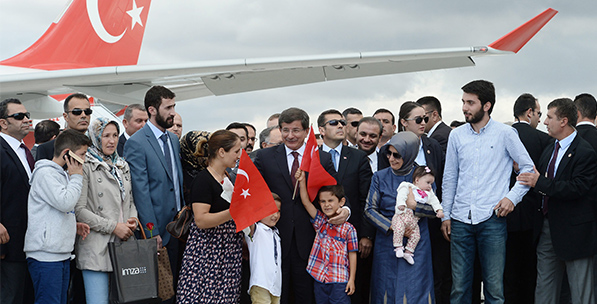Russia's Growing Involvement in the Middle East
Mr. Putin is planning to showcase his military's power in the Middle East and the Mediterranean.
More


Russia in Syria: The Dangers of Military Involvement
Russian involvement in Syria can cause the intensification of the civil war and increase the number of causalities and refugees.
More
US support of Kurdish offshoot group in Syria could backfire in the medium-term.
The international community is silently watching the refugee crisis around the world despite its urgent major humanitarian catastrophe' warning.
Sadık Ünay, the Economy Director of SETA, had a speech about the experience of Turkey on foreign aid and development cooperation issue at the Conference of Changing Nature of Development Aid.
Reduced to a sectarian conflict by many, the danger of Iran must be evaluated as a security issue affecting both political and physical assets of the Gulf countries.
Balancing out Iran's Sectarian Policies
The fact that Shiite militants pose no threat to Western capitals represents the main reason why Washington chooses to ignore the risks, including acts of violence against the Sunni population in Syria and Iraq.
More


Israel and Two Regional Blocs
The Palestinian cause and Israeli aggression were at the heart of both former Egyptian President Gamal Abdel Nasser's popularity and the Iranian revolution's efforts to take down the status quo.
More
Adopting a foreign policy with reference to strategic patience, Washingtons current stance against ongoing conflicts continues to create new problems for the region as well as at the global level
In response to the most recent developments, foreign fighters became a top priority for the intelligence community in Turkey and other European countries.
While trying to understand the causes and outcomes of the war in Iraq, the U.S. administration will need to deal with these multiple challenges and evolving situation on the ground at the same time.
If anyone actually thought that the Arab revolts, the most recent wave of change in the Middle East, would allow Iran and Israel to put pressure on the region, though, time has proved them wrong.
Forty-nine hostages were rescued from ISIS after a successful operation. Considering the delicacy of the situation, the supervision and conduct of this operation appear worthy of commendation.
First and foremost, the Abadi government will have to accumulate enough power to discourage Sunni tribes from joining ISIS fighters. The main question remains: what will happen once ISIS is defeated?
The US presidents appeasement of Israel would shame his former dining partners, whose own stories capture Americas problematic relationship with the Middle East.
Syria with the hundreds of thousands of dead and millions of refugees, has become the most significant humanitarian disasters of the recent history.
Surely, questions about the war in Iraq will never end. We will see more accusations and reporting on this war in the coming years and decades.
Anti-democratic, authoritarian pro-Western regimes hindered political participation and representation to create a hospitable environment for radical organizations.
President Obama's policies on these matters will have serious impacts on U.S. popularity in the world.
During the course of the demonstrations in Kiev, the Central Asian regimes once again tried to avoid possible fallout from these demonstrations by censoring the news about the events.
The slanderous claim of Erdoğan-al Qaeda link has been systematically voiced by the Gulen Group in Turkey. It is impossible to distinguish the mentality behind this slander from the Baath mentality in Syria or the US mentality in Afghanistan.

















